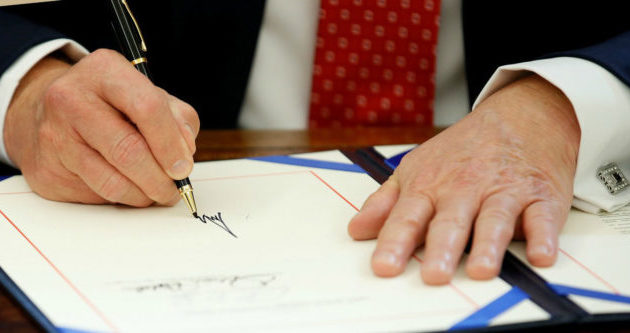IMMIGRATION: President Trump’s Revised EO is Constitutional, Legal, and Common Sense
President Trump has signed a revised Executive Order (EO) on immigration and refugee resettlement. Democrats are already calling it a “Muslim ban.” A question that Democrats should ask themselves: What if former President Clinton had banned the 9/11/2001 hijackers from entering the United States, would we be better off today?
Secretary of Homeland Security John Kelly released the following statement about the EO:
“The Executive Order signed today by President Trump will make America safer, and address long-overdue concerns about the security of our immigration system. We must undertake a rigorous review of our visa and refugee vetting programs to increase our confidence in the entry decisions we make for visitors and immigrants to the United States. We cannot risk the prospect of malevolent actors using our immigration system to take American lives.
The Executive Order signed today is prospective in nature—applying only to foreign nationals outside of the United States who do not have a valid visa. It is important to note that nothing in this executive order affects current lawful permanent residents or persons with current authorization to enter our country. If you have a current valid visa to travel, we welcome you. But unregulated, unvetted travel is not a universal privilege, especially when national security is at stake.
“The Department of Homeland Security has worked closely with the Department of Justice, the Department of State, and the White House to create an executive order that addresses our information concerns while protecting the homeland and our citizens.”
Hans von Spakovsky in his The Daily Signal article “Why Trump’s Revised Executive Order Is Constitutional, Legal, and Common Sense” writes:
President Donald Trump’s revised executive order restricting travel from terrorist safe havens is just as constitutional and legal as his original order, despite what some courts such as the 9th U.S. Circuit Court of Appeals said about the original order.
But the revisions he has made, which clarify that the executive order does not apply to any foreigners who already hold visas to enter the U.S., will make it tougher for activist judges to justify any injunction orders they might be inclined to issue against it. Yet there is little doubt that progressive groups will seek such orders.
The executive order, “Protecting the Nation from Foreign Terrorist Entry into the United States,” confirms what the administration had previously announced, which is that the temporary, 90-day suspension of entry into the U.S. from certain designated countries will not apply to:
- Lawful permanent residents as well as diplomatic, NATO, and U.N. personnel.
- Foreign nationals admitted after the effective date of the executive order.
- Individuals with a visa valid on the date of the executive order.
- Dual nationals travelling on a passport issued by a non-designated country.
- Individuals already granted asylum or refugee status before the effective date of the executive order.
This is an important revision because it voids the due process concerns that the 9th Circuit expressed—namely, that individuals who had already received approval to enter or reside in the United States might have that right taken away from them without a review and appeal process.
Spakovsky concludes, “This executive order is clearly within the president’s authority under 8 U.S.C. § 1182 (f), in which Congress clearly delegated to the president the authority to suspend the entry of any aliens into the U.S. when he believes it would be ‘detrimental to the interests of the United States’.”
ABOUT HANS VON SPAKOWSKY
Hans von Spakovsky is an authority on a wide range of issues—including civil rights, civil justice, the First Amendment, immigration, the rule of law and government reform—as a senior legal fellow in The Heritage Foundation’s Edwin Meese III Center for Legal and Judicial Studies and manager of the think tank’s Election Law Reform Initiative. Read his research. Twitter: @HvonSpakovsky
RELATED ARTICLES:
Tennessee Files Lawsuit Challenging Constitutionality of the Fed Refugee Resettlement Program
Who’s paying for the DACA program? | TheHill
Trump makes key changes to travel ban
Five takeaways from Trump’s new travel ban
Iraq’s lobbyists mobilized after travel ban, documents reveal
Politico: Fight will now focus on 120-day refugee moratorium
No One Mentions That The Russian Trail Leads To Democratic Lobbyists




Leave a Reply
Want to join the discussion?Feel free to contribute!